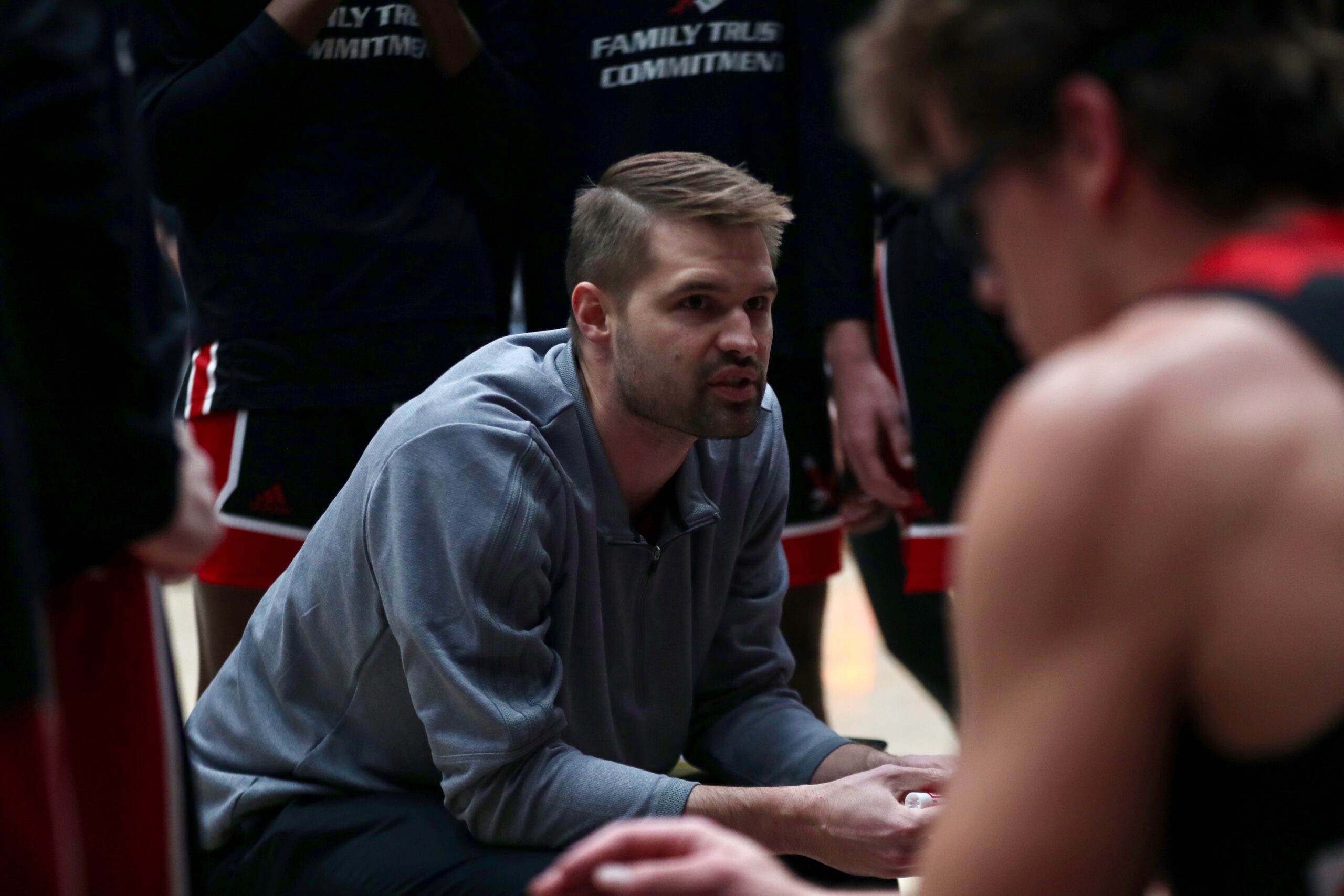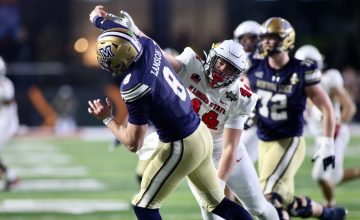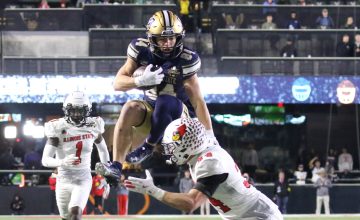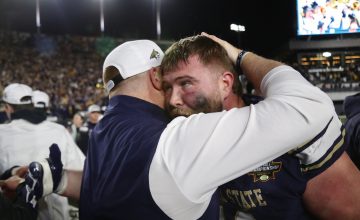David Riley may not have inherited any of Shantay Legans’ players, but he got his predecessor’s combativeness. Midway through the first half of Eastern Washington’s game at Montana to open up Big Sky Conference play last week, Riley faced up with his counterpart Travis DeCuire after EWU’s Steele Venters sent Montana’s Aanen Moody careening into the media table. As the refs broke up the staredown and hit both coaches with bench warnings, Riley turned to them, arms outstretched and questioning, body language clear from the other side of the court.
For what?
It was a quick episode (“No comment,” DeCuire said after the game; “It was a miscommunication, I think,” Riley offered) that foreshadowed a weekend of drama for the Eagles.
Down seven at multiple points in the second half of that Montana game, the Eagles fought back for an 87-80 win. On his second try, it was Riley’s first victory over the Griz in Missoula, a milestone that took Legans until his fourth (and final) season at EWU to achieve.
Two days later, Eastern crossed Homestake Pass and outlasted defending conference champion Montana State in Bozeman, 70-67, when Steele Venters hit a crucial 3-pointer to break a 65-65 tie with 19 seconds left.

The sweep put Eastern Washington on top of the league after two games, sharing a 2-0 record with Weber State (expected) and Idaho State (extremely not).
It also solidified the Eagles as an early contender in Riley’s second year, and might have put the rest of the league on notice. With a starting backcourt of Tyreese Davis (6-foot-6), Angelo Allegri (6-7) and Venters (6-7), plus two 6-10 posts in Ethan Price (last season’s Big Sky Freshman of the Year) and Dane Erikstrup, Eastern Washington will cause matchup problems all season long.
No one in Eastern’s regular rotation is shorter than 6-foot-6. After he talked at length about the problems posed by Eastern’s size on the pregame radio show, DeCuire still saw his Grizzlies get out-rebounded 45-28 in their loss. In Bozeman, the advantage was 40-29 against a Bobcats team with all-conference post Jubrile Belo, the reigning MVP of the league.
For Riley, it was the best weekend of his short tenure after an inconsistent and ultimately fruitless debut season ended with an 11-9 conference record and two respectable postseason losses, 68-67 to Northern Colorado in the quarterfinals of the Big Sky tournament and 83-74 to Fresno State in the first round of The Basketball Classic.
“My first year, I didn’t know how to talk to officials, or recruit as a head coach,” Riley said. “There’s a lot of new things.”
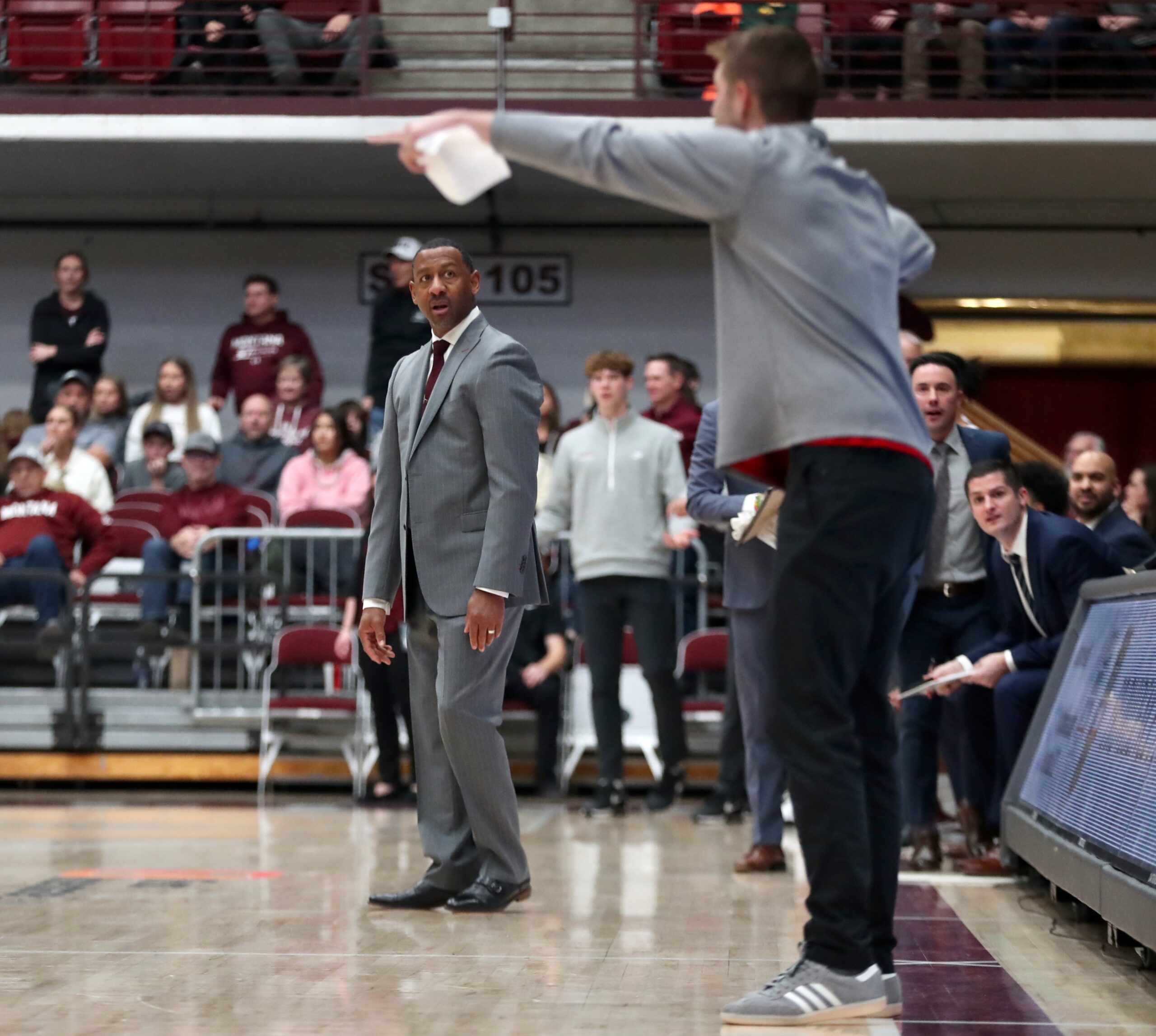
Riley was promoted when Legans left EWU after his finest year – 15-3 against Big Sky teams, with single-digit losses at Washington State, at Arizona, at St. Mary’s and against Kansas in the first round of the NCAA Tournament – to take the head job at Portland. But elevating Legans’ top assistant did little to stop a mass exodus reminiscent of North Dakota State football fans fleeing Fargo for Frisco every January.
The Eagles’ top seven scorers from 2020-21 – several of whom had eligibility remaining – all left Cheney.
Big Sky MVP Tanner Groves and his brother Jacob transferred to Oklahoma. Defensive Player of the Year Kim Aiken Jr. ended up at Arizona. Australians Tyler Robertson and Jack Perry, along with guard Mike Meadows, followed Legans to Portland. Former all-league wing Jacob Davidson transferred to Cal Poly.
That left Riley with Ellis Magnuson and Venters, who’d each averaged 3.6 points per game in 2021, and no choice but to build the rest of his roster out of the transfer portal himself.
That worked well enough for one year, with transfers Rylan Bergersen (Central Arkansas), Allegri (UNC Greensboro) and Linton Acliese III (San Francisco State) making an immediate impact. Venters took a big step forward to lead the team in scoring, but that trio was right behind him, and their plug-and-play contributions kept the Eagles from slipping out of the middle tier of the conference. It was a perfect case study in the tempting new possibilities opened up by the transfer portal, the extra COVID year and all the other rule changes transforming college sports – build an entirely new roster every year, still finish in the top half of the conference, repeat.
“They’ve done a good job of getting transfers,” DeCuire said. “Some programs have found a way to get guys in their fourth, fifth year. You can get young guys to transfer as well and so they’ve found some pieces.”
A year later, though, the Eagles have offered up their own real-world rebuttal to that approach, and their hot start in 2023 looks more like the result of development and continuity.
Between Venters, Allegri (who returned for his optional extra year of eligibility) and Price, Eastern’s top three scorers were all on the roster last year. So was leading rebounder Casey Jones, who like Price, is now a sophomore.
With that core in place, new arrivals like Davis (Jacksonville), Cedric Coward (Willamette) and Erikstrup (Cal Poly Pomona) have settled in as complementary pieces.
“Continuity is so important,” Riley said. “We still have a lot of new faces. But the difference is, we got guys who played minutes last year that are coming back. We got three starters – double-figure guys – returning, and for them to have that experience, that’s what it takes to win big games.”
After his crazy first year, Riley certainly has experience with just how useful transfers can be. But one year in, it’s continuity that has the Eagles navigating the drama and looking like contenders.
“I think it comes down to our six returners, they were really vocal when we got back after our last game about how important it is that we stick together and how we have to be mentally tough to go get a win at Montana,” Riley said. “We just had some incredible leadership by our veterans – Steele, ‘Gelo, Tyreese – they led us through that game when it was tough.”

